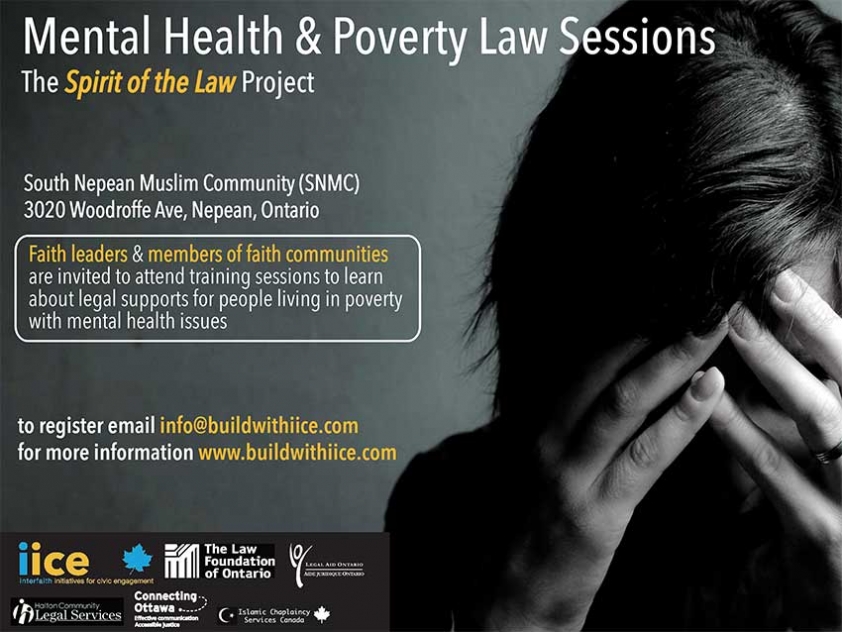 Local Imams Attend Workshop on Mental Illness and the Law delivered by Connecting Ottawa.
Local Imams Attend Workshop on Mental Illness and the Law delivered by Connecting Ottawa.
Dec
Holistic Support: Local Imams Attend Workshop on Mental Illness and the Law
Written by Chelby DaigleIn early December, local imams, along with other faith leaders, attended a workshop at the South Nepean Muslim Community (SNMC) mosque exploring the intersection of mental illness and the law. The workshop was presented by Connecting Ottawa as part of The Spirit of the Law, a provincial project run by Interfaith Initiatives for Civic Engagement (IICE) and funded by the Law Foundation of Ontario. The project aims to work with faith communities to ensure that people living with mental illness who come in to conflict with the law can receive support by ensuring that faith communities and legal professionals are taking a holistic approach to their care.
Haitian Canadian lawyer Alexandra Derisier, who works with Connecting Ottawa, delivered the workshop. It explored a number of issues related to mental illness and the law, including running through typical scenarios that faith leaders might encounter and providing them with contact lists for legal and mental health services.
Derisier sees faith leaders as an important asset for services like hers, which offer support to people who experience barriers, such as language or disability, to accessing legal services. “Faith leaders have access to people we wouldn’t have access to. They are exposed to people who have all kinds of problems who don’t necessarily trust the system or know where to go. So faith leaders bring people to us so they can get access to services they otherwise might not have known of,” she explained, “If one of my clients is Arabic speaking and spends all of their time in the Arabic speaking community, they might not know to come to me, but their faith leader could know to come to me.”
According to Michael Skaljin, the director of IICE, “The organization is an emerging non-profit which aims to help professional sectors like health care, education, corrections, [and] build bridges with the faith sector in terms of professional understandings, relationships, communications. We do trainings and public education. On the other side, we also work with the faith sector for them to better understand all of those other sectors. We need to break down the silos because the faith sector like many sectors is siloed from other professionals. So we look at how to approach things more holistically, encouraging leaders for the different sectors to work together in the best interest of those they are providing service to.”
Derisier, who is herself very involved in Ottawa’s Haitian Christian community, agrees that faith leaders are often overlooked as partners in service provision by other sectors. “Sometimes we want to dissociate the person’s mental illness from their faith and we can’t do that. Because sometimes they are going to need their faith to help to cope with their mental illness and sometimes even their faith is a trigger for their mental illness so you can’t dissociate it.”
She feels that having faith leaders who are properly educated about mental illness is essential in combating the stigma towards mental illness in some religious and cultural communities. “I used to [practice] refugee law and I would tell my clients that they need a psychological assessment,” she said, “And they would say ‘No, I’m not crazy!’. But no one said they were ‘crazy’. There are cultural practices that prevent people from seeking psychological help and there are religious practices that prevent people from seeking psychological help. So a person fears that if they go forward with seeking psychological help they will be branded by their community as ‘crazy’. But if faith leaders are cognizant of the supports out there for people coping with mental illness, it makes it that much easier for people to get the help that they need.”
Imam Ahmed Limame of the Gatineau Mosque, attended the session along with Imam Zijad Delic, the imam of SNMC who hosted the session, and Imam Sikander Hashmi of the Kanata Muslim Association.
Imam Limame found the workshop incredibly useful for his work as an imam. “Many times in the past I wish I had had Connecting Ottawa’s number, I really could have used their help,” he shared, “Many times I have referred people in the past to psychiatrists or legal workers, but now I really see the importance of making sure I follow up and work more closely with these other professionals on these cases. I realized that we need to work in a team instead of me just being focused on the spiritual angle. We need to work together to support people more holistically. I have already asked Connecting Ottawa if they could come to present at my mosque and I’m very pleased that people who work with them speak French.”
He also feels that there needs to be more opportunities for imams and other faith leaders to receive professional development on issues such as mental illness and legal services. “I think to do your job well as an imam you need to be aware of the issues but also have specialized workshops so we can do our job effectively.
Imam Michaal Abdur Rashid Taylor is the Ontario Regional Chaplain with the Ministry of Corrections and is an advisor on the Spirit of the Law Project. He also is the current secretary of the Canadian Council of Imams, based in Toronto. Imam Taylor has 10 years of experience in organizing training on mental health issues for religious leaders, including imams, as he was the Director of Spiritual Care for the Canadian Centre for Addiction and Mental Health.
He sees it as essential that imams are offered professional development opportunities such as this workshop. “Many imams do not have training on mental health and that’s a serious gap,” he explained, “Programs that sensitize and train imams on how to support people living with mental illness are urgently needed right now. But the thing with working with imams is that you have to find time. It is exceedingly difficult to find time in these men’s lives. They are very very busy. You have to pre-plan and slot the time so you can get the commitment from the imams to be there.”
Imam Taylor is pleased that three imams from Ottawa-Gatineau were able to attend the workshop and plans to work with the local community to organize more sessions for Muslim religious leaders as well as leaders in other faith communities in Ottawa.
To learn more about Connecting Ottawa visit their website
To learn more about the Spirit of the Law Project visit the IICE website
This article was produced exclusively for Muslim Link and should not be copied without prior permission from the site. For permission, please write to info@muslimlink.ca.
















